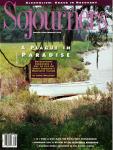South African church leaders have been thrust back into the forefront of the struggle against apartheid in the wake of the June 17 massacre in the township of Boipatong and the subsequent move from negotiations to mass action. The South African Council of Churches (SACC), which organized the funeral service for 37 of the Boipatong victims, said the white government has no legitimacy to remain in power.
"Our responsibility to God, who is a God of justice, impels us to take a stand against the government," church leaders said after the massacre. "We believe that the National Party, which came into power through an undemocratic, racialistic minority vote and which has maintained itself in power through violence, has no justification whatsoever to prolong its stay in power."
SACC General Secretary Rev. Frank Chikane and Anglican Archbishop Desmond Tutu led a delegation of church leaders in a "pastoral and prophetic" visit to Boipatong 48 hours after the killings. Tutu told the mourners at the service, "We are trying to bring a little oil to pour on your wounds. Let us wipe your tears. We are also crying."
At a news conference following the delegation's tour of the stricken township, Chikane decried the government's complicity in the massacre. "Given the length of time of the operation of killings and the number of people who were involved, in any normal country it would have been stopped instantly," Chikane said. He charged that the government made sure that its "prophecy" was fulfilled that the mass action launched by the African National Congress on June 16 would "create a climate for violence."
Just days before the massacre, church leaders warned that the government's refusal to make "meaningful concessions" would likely lead to violence. Beyers Naude, a long-time anti-apartheid activist and Afrikaner pastor, said that the government was "going to hold out on power for as long as possible." Naude warned that the government was "going to ensure that politically, economically, and militarily they remain in control. And that, in my mind, can only lead to an open conflict and inevitably also to bloodshed in our country."
SACC investigators and the Johannesburg-based Human Rights Commission reported evidence of police collusion in the massacre. Boipatong residents testified that before the raid, police - who had received a call warning of a pending attack - removed makeshift barricades and roadblocks residents had put on the streets. Witnesses said that the attackers were ferried in casspirs and other police vehicles into the township. Many of the bodies of those killed, according to witnesses, were removed by the police in what was suspected to be an attempt to reduce the reported death toll.
The South African church leaders urged the international community to support their efforts to end apartheid, calling "all our partners abroad to...use all possible pressure to move the South African government" to end the ongoing violence and move immediately toward genuine democracy.
Jim Rice is editor of Sojourners.

Got something to say about what you're reading? We value your feedback!
